How to Put a Thesis Statement on a Powerpoint
Writing a thesis is stressful but preparing an oral defense can be even more painful.
But it doesn't have to be, with proper preparation and a good presentation you will be able to better equip yourself come time to present your thesis defense.
But what makes a good thesis defense?
A proper presentation helps you with your thesis defense because it helps you to capture the panels attention and give you cues and reminders on what to say as well.
It also helps keep your data organized, while visually looking good and provides a flow structure for the rest of your presentation.
In today's article we will be giving you The Right PowerPoint Templates for Your Thesis Defense and a powerful outline composed of best practices and layouts are specifically designed to help you defend your thesis in both written and oral presentation.
On the next segments of this article, we'll walk you through the most feasible process on how to ace this kind of presentation.
Let's dive into the outline of what makes a great thesis defense.
- Thesis Defense Overview
- Thesis and Dissertation Distinguished
- Similarities
- Type of Degree
- Purpose
- Thesis and Dissertation Distinction Varies on Location
- Three Most Common Thesis Defense Myths
- Structure and Slides Content
- Title Page
- Introduction
- Literature Review
- Methodology
- Results
- Discussion
- Conclusion
- Tips During Your Oral Defense
- More Quick Tips on How to Present!
Thesis Defense Overview
A thesis defense is composed of two parts – a thesis and a defense.
Thesis, according to Grad School Hub, represents a student's collective understanding of his or her program and major.
Universities often include a thesis in every course as one of the final requirements to earn a particular graduate or postgraduate degree.
Thesis, however, isn't just a mere requirement.
It helps the students to grow out of their shell from their respective discipline and give them the opportunity to present all their findings of their study.
Moreover, some people think a thesis is just a long essay but it's not. Unlike an essay, a thesis needs to assert something.
This can be considered as one of the most crucial research documents which a student makes during their academic schooling.
On the other hand, a defense is the presentation of the pieces of evidence to support and prove your research.
It's the most essential part of the thesis process.
Your presentation has to be prepared to answer question from members of the committee and any other panel present, and it's your job to convince them and defend your thesis with ample proof.
Prior to presenting you have to carefully determine what appropriate evidence should be presented before the panel depending on what thesis you have to defend.
Thesis and Dissertation Distinguished
A thesis or dissertation is usually required to complete a particular graduate degree. And these two words are often used interchangeably by most students when referring to research studies.
But while being almost similar in format or structure, it's worth to note that they have significant differences that set them apart from each other.
Similarities
The very reason why thesis and dissertation are treated the same is that these two are both extensive papers. Not just merely long essays like what others are claiming.
Both of these papers are extensive. Which is why students are given ample time, usually the entire last semester at the last year of study, to complete all the requirements and finally acquire their degree.
With regards to structure, both papers are very similar with few differences.
Differences Between Thesis and Dissertation
One of the significant differences of the two is to whom the paper is assigned. A thesis is usually required for those students earning a bachelor's or master's degree. While a dissertation is for those who want to obtain a doctorate degree.
However, not all students taking a master's degree are required to make a thesis. Prior to their enrollment, they have been given a choice whether they'll go for a non-thesis program or with a thesis.
Those who have a plan to escalate their degree to doctorate, eventually should take the path of with thesis. This is to prepare themselves for a more extensive dissertation requirement as doctorate students. Otherwise, they will be only limited to earn a master's degree.
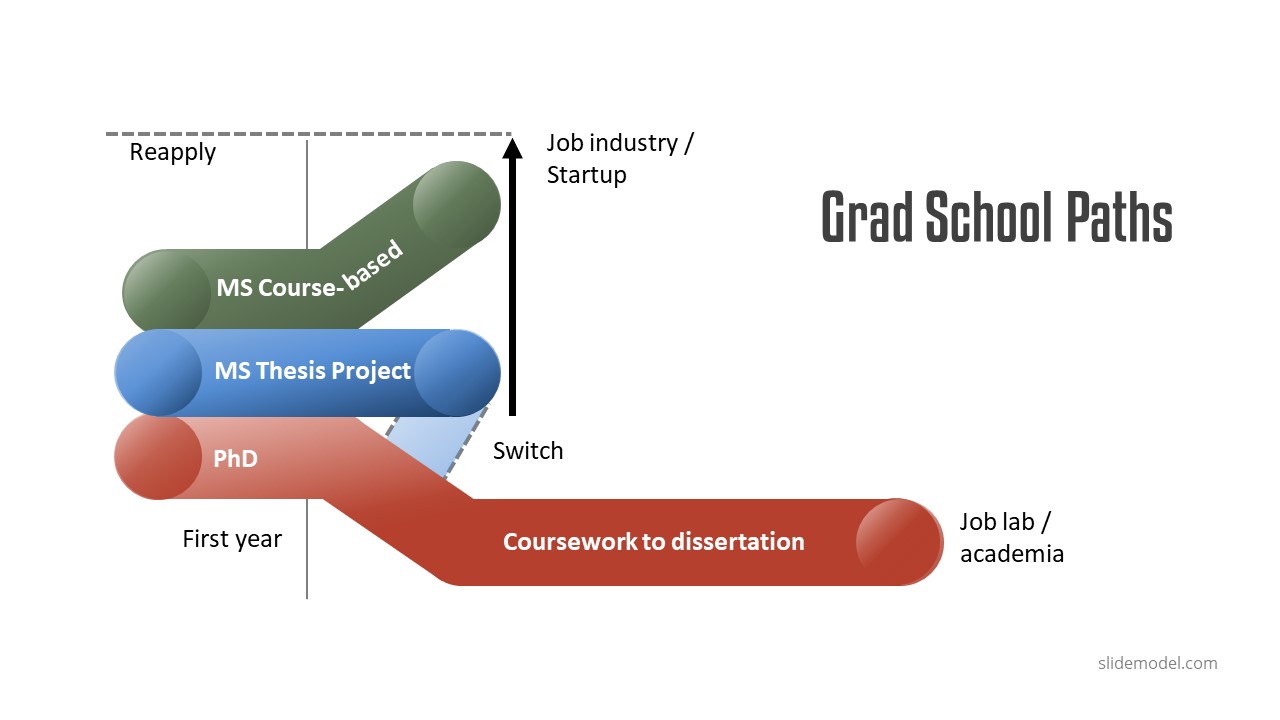
Purpose
But above all, the most significant difference between the two papers is the purpose for which it is written.
A thesis, like what has been mentioned above, is being done by students obtaining a bachelor's or master's degree and has the purpose of testing their understanding of the discipline they're engaged with.
A thesis is focused on obtaining technical expertise.
On the other hand, a dissertation is made for students to come up with an original study that hasn't already been studied by other researchers.
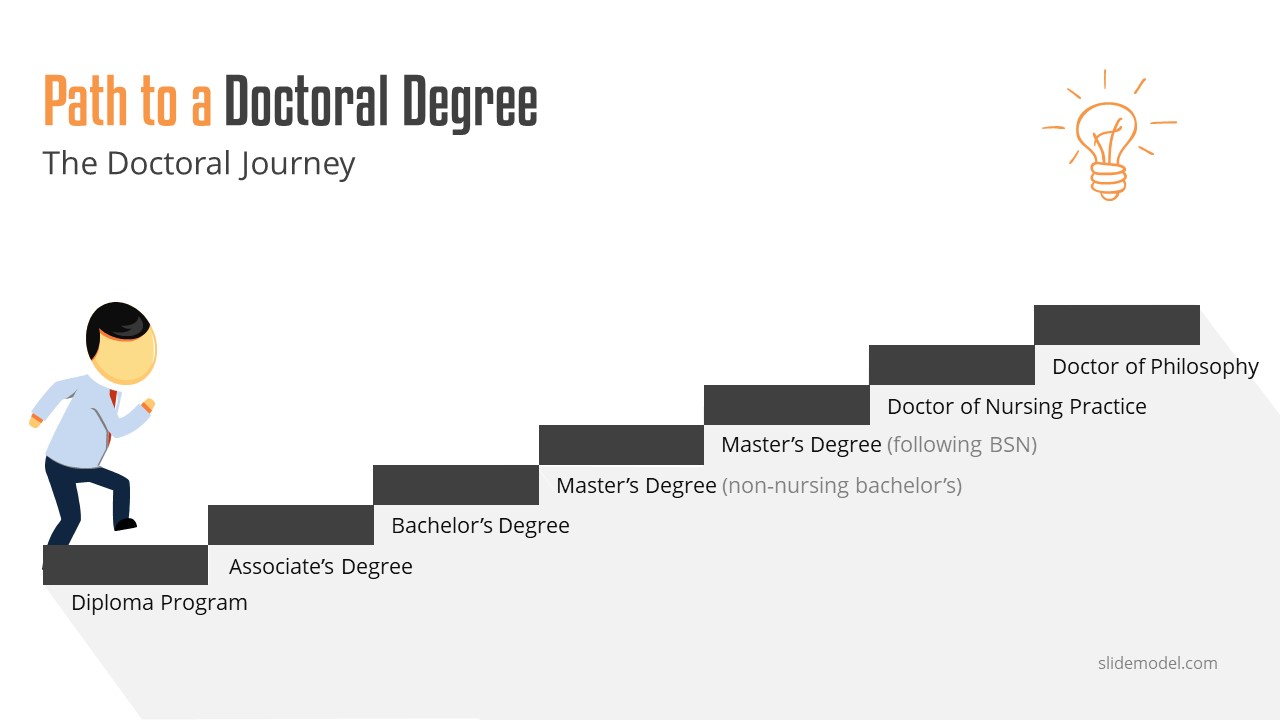
Thesis and Dissertation Distinction Varies on Location
USA: In the United States of America, they consider thesis as shorter than a dissertation. In fact, aside from being a requirement to graduate in college, a thesis is now also inculcated in master's degree programs. And since dissertation is more extensive, the thesis is treated as preliminary in gaining a doctorate degree.
Europe: The distinction between the two papers is almost opposite to that of the USA. In Europe, a dissertation is only a broader research study from a post-graduate program and not the making of original research. Instead, educational systems in the said continent treat the doctoral thesis as a more elaborate paper writing.
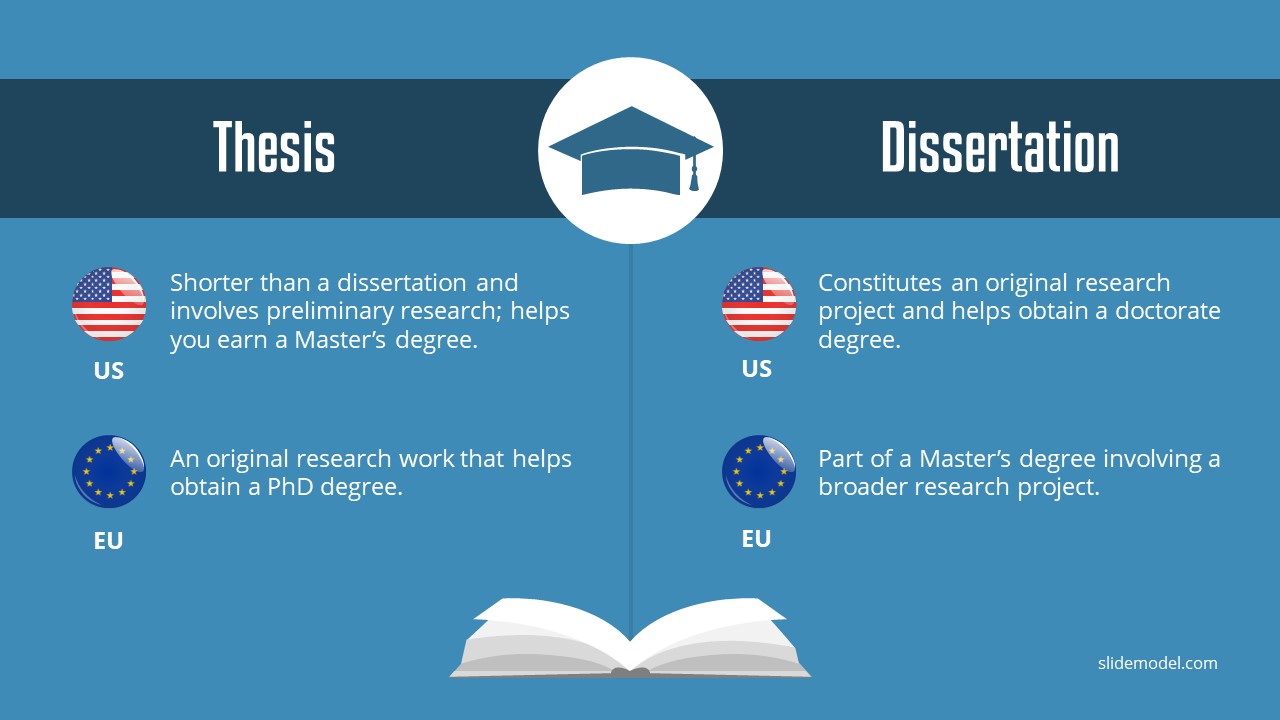
The difference between a thesis and a dissertation might not seem that big, but it's important that we know what makes them different.
Three Most Common Thesis Defense Myths
If your upcoming defense gives you pressure and uneasiness, it could be cause you are not sure what to expect. Today we will dispel three common thesis defense myths that will help you be more confident in your presentation.
Myth #1
"Answer all the questions correctly. Otherwise, you're thesis won't get approved."
You are expected to have a focus on your research.
That being said, you have to study each part of your thesis, every detail, and even your sources.
You have to study and practice how to effectively deliver your presentation.
But don't overthink to the extent that you're stressing yourself to know everything perfectly.
Don't overstress if can't answer one of the questions, this doesn't necessarily mean the committee won't approve your thesis.
You should know that research is a continuous study.
So you should expect that your committee will always be able to find a gap in your study to fill in the future related researches.
So in times you don't exactly know the answer, admit it and you'll learn as they give their sides or suggestions.
Making up an answer will only displease your committee, so it's be to be upfront, honest and transparent.
Myth #2
"The committee is just there to find holes in your study. They don't care about you."
One of the typical descriptions students have of the committee, is that they are just there to poke holes in your thesis.
Going in with this perspective makes standing before them a nerve-wracking experience.
Relax.
They're not your enemy.
In fact, they are there to help you polish your study.
They might challenge you with difficult suggestions and tricky questions.
In the end, they will walk you through the process to come up with better results that won't only benefit you but also your research.
They care about you and your study, and they're ultimately there to make your thesis and the research better. Seperate yourself from your work and look at it objectively and don't take their comments personal.
Myth #3
"If your thesis defense isn't successful, you have to start your thesis all over again"
An unsuccessful defense is one of the worst case fears most students have.
One thing that you should be aware of is when you aren't able to please your committee, you don't need to start a new thesis again or go back at square one with your existing paper.
It's unusual that your committee will ask you to change your topic and start from scratch again.
The fact that you've been permitted to defend your study that means your research is almost complete.
They might suggest further details or ask you for minor revisions and that's normal.
But overall, you need to go into this defense thinking that your presentation will be successful, otherwise you are already setting yourself up for failure with the wrong mindset.
Remember that positive thoughts attract positive results.
Looking For A Beautiful Premade Thesis PowerPoint Template?
Check Our Thesis Templates From SlideModel.com Below
Presentation Structure and Slides Content
1 – Title Page
This slide should contain the information that is provided on the title page of your hard copy

- The title of your research paper
- Your name
- Where you are studying
- Name and details of your course
- Name of Adviser
2 – Introduction
Your introduction slide should provide the committee an idea of the following:
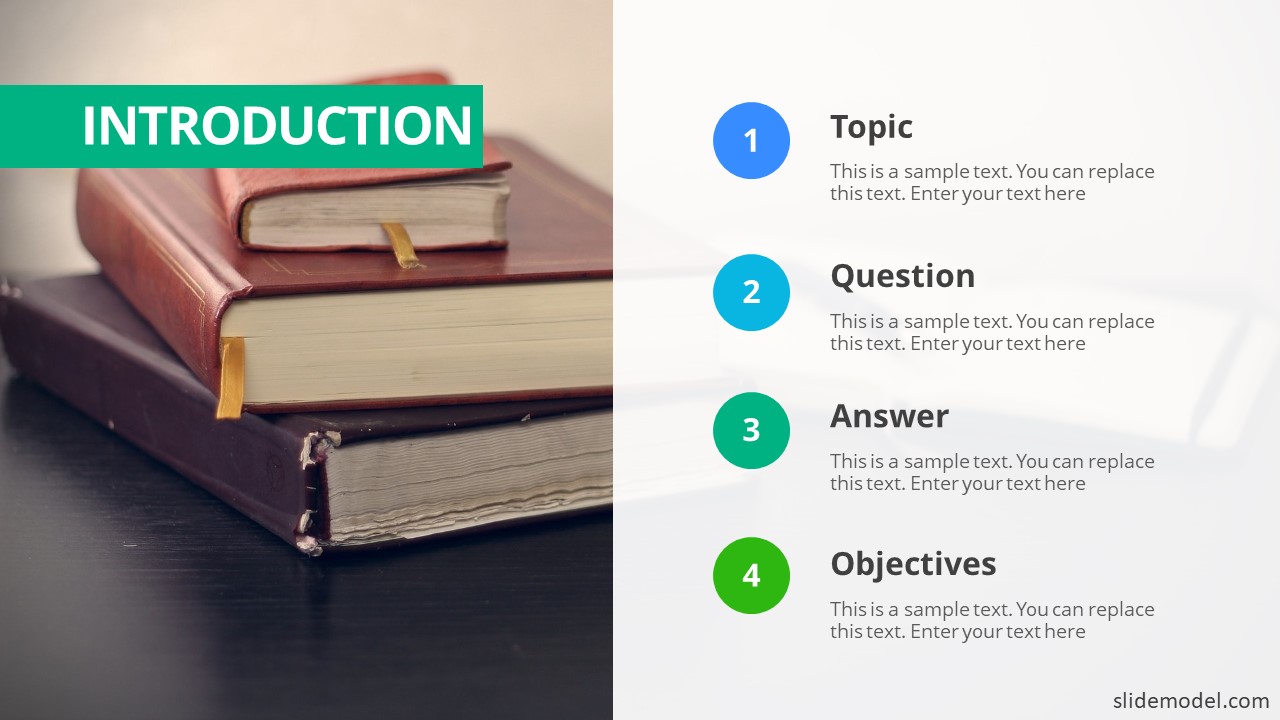
- What is the topic area that you are investigating ?
- What are the specific research questions that you set out to answer?
- Why is this question important to answer?
- What were the objectives of your research?
3 – Literature review
It's not necessary to cover everything that's currently understood in the available literature. You may want to present the following:

- Relevant current research that is close to your topic
- Different theories that may apply to your specific area of research
- Areas of weakness that are currently highlighted
4 – Methodology
Make sure to touch the factors below within your process:
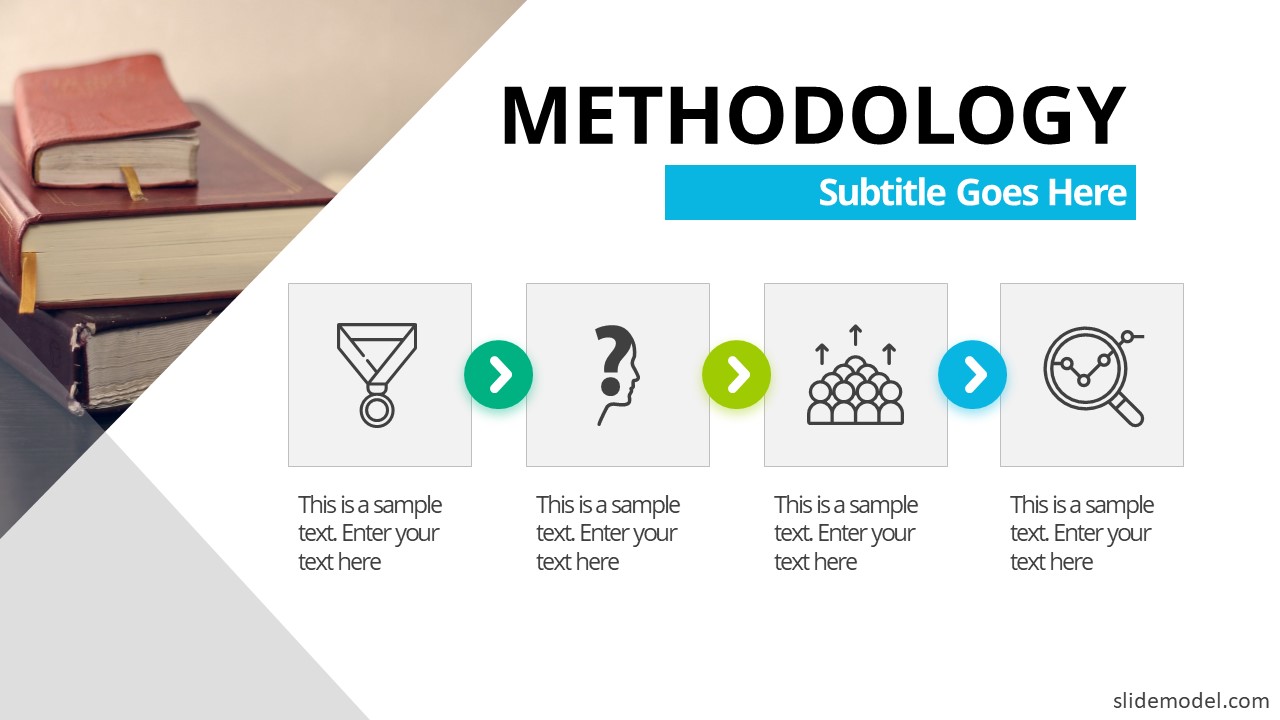
- The type of study you have conducted: qualitative, quantitative, or mixed
- The methods that you chose and why
- Details of the population, sampling methods, and other information
- Provide information regarding how you have analyzed the data that you have collected
5 – Results
This part should give the committee / audience a good understanding of what you've discovered during your research. It should cover the following:

- An overall description of the data that you collected during your research
- The results of the analysis that you have done on that data
- What were the most significant findings from your data
6 – Discussion
Highlight here the meaning of the findings in relation to your discipline program and the research that you have done:

- What are the major findings and what do they mean with regard to your research
- How do these findings relate to what others have found in the past
- How can you explain any unusual or surprising result
7 – Conclusions
You have to end your presentation with a conclusion summarizing all that you have found within your research. You need to:
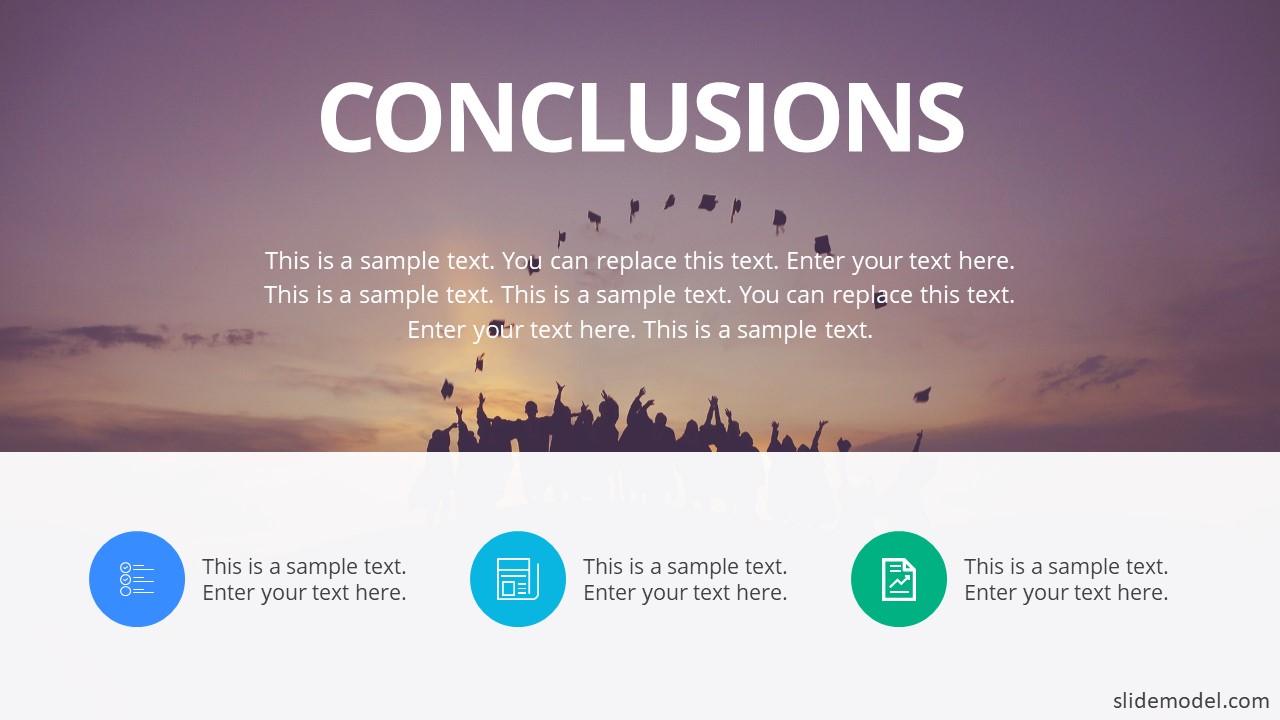
- Restate your research questions
- Show how your results answer these questions
- Show what contribution you have made
- State any limitations to the work you have done
- Suggest future research
- Make any recommendations
See Also: How to Create a Great Investors Pitch Deck and Close the Deal
Tips During Your Oral Defense!
Review Your Materials
Even if you already feel confident with your upcoming presentation, you still need to review your materials.
You can bring the hard copy of your thesis with you during the defense, but you don't want to get lost with your presentation when you forgot some specific details and have to scan your papers.
You should know your paper in and out.
Rehearse Your Presentation
It's not wrong if it will sound like a script when you speak in your oral defense. It's expected and understandable.
You need to practice your presentation especially when there's a time restriction given to every presenter.
You only need to prepare enough number of slides that would fit your time limit. A hundred slides aren't suitable for a 15 to 20-minute presentation nor 10 slides for an hour of defense.
Your rehearsal will be more effective if you practice it in front of an audience.
Note: You will experience a complete silence in the defense room. You might feel awkward because most of the time, you're the only one speaking out loud. This is completely fine and it's something you should practice in rehearsal should you be afraid.
Narrow the Presentation of Ideas
Regarding your slides, you don't have to include everything that's in your paper. You should narrow down your ideas to the main points and the most important details such as the statistics and findings.
If the members of your committee think you lack details or they want to hear a further explanation, they won't hesitate to ask you.
Prepare for the Unexpected Questions
The panel tends to challenge the presenters usually through some hard questions.
Its aim is how well do you you have done your research, and how prepared you are.
But as long as you know the ins and outs of your paper, you shouldn't lose your confidence regardless of which questions they ask.
Just keep in mind that what you're saying in your oral defense is not in conflict with what is written on the hardcopy you provided them.
What To Do When You Don't Know the Answer
If the committee asked you a question and you don't know the answer, don't make up a baseless answer.
Baseless means out of context answers, or something without proof or backup.
How To Deal With The Nervousness
The committee is expecting you to be nervous. Of course, it's normal.
However, one effect of being nervous is the changes in your behavior.
There's a tendency you'll talk fast that which will make it hard for the committee to understand you.
It might also cause you to have a mental block.
So try to slow down. Take a deep breath.
Inhale, exhale. Remember to breath!
It's OK to pause and it's ok to take your time, it's more important that the committee clearly understand what you are trying to articulate.
More Quick Tips on How to Present!
- Introduce yourself at the beginning
- Introduce the title of the presentation
- Don't read your notes if possible
- Don't speak too fast
- Put an emphasis on what you're saying, so you don't sound like monotonous
- Look at your adviser once in a while for possible signs
- Stand on the right of the white screen if you are right-handed so you can easily refer to the slide without giving your back to the committee
- Face the audience when you talk
- Keep an eye contact
- Make sure to keep attention to the reactions of the committee and don't forget to react in turn
We hoped you enjoyed this article on how to do a proper thesis defense, and how to best prepare for one using proven tips and techniques to help you get through this. Hopefully, after your defense, you will be set as the one in your class to deliver an inspiring graduation speech for your peers. If you got value please remember to share this article.
1. MasterDoc PowerPoint Template

Creating a Thesis presentation should be a straight forward task; based on your thesis document and following the tips described above you have a high level structure already outlined. The MasterDoc PowerPoint template provides professional layouts with texts and image placeholders; so you can create document like slides using your thesis defense as your content. This template is ideal for a highly detailed documents, where visuals and words unite to illustrate one concept per page. The result is an asset that can be read and digested more quickly than either your thesis document or a presentation created for assisting a speech. A document created with the MasterDoc PowerPoint templates is meant to be printed or distributed, read on screen without the accompaniment of a presenter or used in an e-learning platform as pure learning content.
Use This Template
2. Thesis Presentation PowerPoint Template

You had invested a considerable time researching, testing hypothesis and confirming your thesis. Craft your thesis presentation with the same level of detail you applied in your work. Using the Thesis Presentation PowerPoint Template you will focus only in your content and your message. The layouts, images,design and structure will be taken care by the template.
Use This Template
3. Master Thesis PowerPoint Template

The Master Thesis PowerPoint Template is a professional document designed for postgraduate degrees presentations. It provides simple sections that follow the structure and best practices of traditional research thesis presentations. Starting with the introduction to the theory and state of the art scenario; following with hypothesis research and its findings and concluding with the confirmation or negation of the initial thesis statement.
Use This Template
4. Essay Outline PowerPoint Template

Your thesis defense can be accompanied by an essay, that states your thesis and argues about it using several supporting paragraphs. This kind of document is ideal to be an intermediate step between reading assisting to the thesis presentation and reading the complete thesis documentation. It has more information that your thesis defense abstract, but does summarizes the supporting evidence and examples that allows the argument of each idea behind the thesis. You can use the Essay Outline Template to present your Essay outline and create an essay linked to your thesis defense documentation.
Use This Template

How to Put a Thesis Statement on a Powerpoint
Source: https://slidemodel.com/proper-thesis-defense-using-right-powerpoint-presentation/